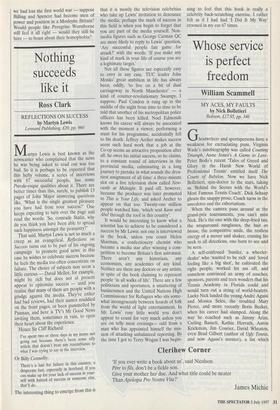Nothing succeeds like it
Ross Clark
REFLECTIONS ON SUCCESS by Martyn Lewis Lennard Publishing, £20, pp. 960 Martyn Lewis is best known as the newscaster who complained that the news he was being asked to read out was too bad. So it is perhaps to be expected that this hefty volume, a series of interviews with 67 successful people, has some Pravda-esque qualities about it. There are better times than this, surely, to publish 13 pages of John Major answering questions like, 'What is the single greatest pleasure you have had from your success?' One keeps expecting to turn over the page and read the words: 'So, comrade Stalin, why do you think you have been able to spread such happiness amongst the peasantry?' That said, Martyn Lewis is not so much a creep as an evangelical. Reflections on Success turns out to be part of his ongoing campaign to promote good news: in this case he wishes to celebrate success because he feels the media too often concentrate on failure. The choice of subjects may seem a little curious — David Mellor, for example, might be rich but does not at present appear to epitomise success — until you realise that many of them are people with a grudge against the media. They've either had bad reviews, had their names muddied on the front pages, or been pummelled by Paxman, and here is TV's Mr Good News inviting them, sometimes in vain, to open their heart about the experience.
Hence Sir Cliff Richard:
I've spent two or three days in my home not going out because there's been some silly article that doesn't bear any resemblance to what I was trying to say in the interview.
Or Billy Connolly: There's a lust for failure in this country, a desperate lust, especially in Scotland. If you can make up for your lack of success in your- self with hatred of success in someone else, that'll do.
The interesting thing to emerge from this is that it is mostly the television celebrities who take up Lewis' invitation to denounce the media; perhaps the mark of success in this field is when you begin to forget that you are part of the media yourself. Non- media figures such as George Carman QC are more likely to reply to Lewis' question, `Are successful people fair game for attack?' with the words: 'If you make any kind of mark in your life of course you are a legitimate target.'
Not all these figures are especially easy to envy in any case. TUC leader John Monks' great ambition in life has always been, oddly, 'to live on a bit of dual carriageway in North Manchester' — a kind of counter-revolutionary Swampy, I suppose. Paul Condon is rung up in the middle of the night from time to time to be told that another of his metropolitan police officers has been killed. Noel Edmonds knows his career will always be associated with the moment a viewer, performing a stunt for his programme, accidentally fell to his death. Jeffrey Archer makes success seem such hard work that a job at the Co-op seems an attractive proposition after all: he owes his initial success, so he claims, to a constant round of interviews in the provincial media, culminating in a long journey to partake in what sounds the drea- riest assignment of all time: a three-minute slot on a live television show called New- castle at Midnight. It paid off, however, because the producer was later promoted to This is Your Life, and asked Archer to appear on that too. Twenty-one million people watched him, 'which sent Kane and Abel through the roof in this country'. It would be interesting to know what a scientist has to achieve to be considered a success by Mr Lewis: not one is interviewed in the book, unless you count Helen Sharman, a confectionery chemist who became a media star after winning a com- petition to become Britain's first astronaut. There aren't any historians, any economists, any academics of any kind. Neither are there any doctors or any artists, in- spite of the book claiming to represent people 'in all walks of life'. There are a few politicians and sportsmen, a smattering of businessmen and the United Nations High Commissioner for Refugees who sits some- what incongruously between hoards of folk from the world of light entertainment. In Mr Lewis' rosy little world you don't appear to count for very much unless you are on telly most evenings— odd from a man who has appointed himself the mis- sion of attacking unbalanced reporting. By the time I got to Terry Wogan I was begin- ning to feel that this book is really a celebrity back-scratching exercise. I rather felt as if I had had 'I Did It My Way' crooned in my ear 67 times.


























































 Previous page
Previous page